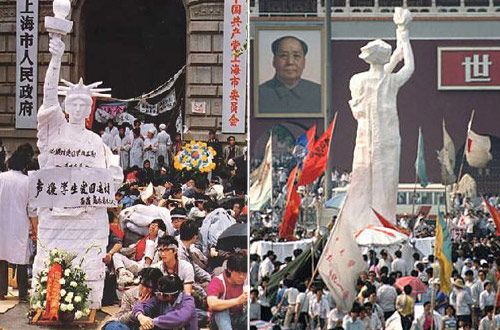
Buying into Communism
"People are prepared to obtain order and tranquility by giving up other values such as democracy and freedom. This dangerous temptation has not disappeared, even today." — Mikhail Gorbachev, 1993
June 4, 2009. I opened the day in Shanghai, meeting with one of America's largest brands to discuss their expansion plans in China's 2nd tier cities. On the flight back to Beijing, the entertainment included a program on preparing your dog for the arrival of a new baby to the family. The headlines of the local newspaper spoke of Obama's visit to Saudi Arabia and the possible sale of Hummer, an American luxury brand, to an automaker from Sichuan.
The air hostess handed me a copy of the Global Times, the official English-language propaganda vessel of China's Communist Party. On the bottom of the front page, an article titled "Prosperity tangible along Chang'an avenue" spoke of China's progress since the 'June 4 Tian'anmen incident'. Apart from a short mention of 'pitch-black charred bodies of soldiers', there was no reference to what actually happened that day or why.
The article continued on page two, headlined, "20 years later, China is now called a world power". The author quoted various local experts carrying messages about the country's development over the last two decades and summarized the article's main point: 'The Chinese people, especially the young, have become much more apathetic about politics than they were decades ago. Education, medical insurance, and employment are among their top priorities.'
On May 15, 1989, Mikhail Gorbachev landed in Beijing. The official welcoming ceremony was held at Beijing airport and not in Tian'anmen square as originally planned. The square was occupied by thousands of demonstrators and hunger strikers. As Jeffrey Wasserstrom points out, some of the protesters mused about 'the injustice of Heaven having provided Russia with a Gorbachev, while they only got a Deng Xiaoping'. The photos above were taken that year. On the right, Tiananmen square. On the left, Shanghai's government building.
Since then, China has experienced two decades of record economic growth, witnessed the chaos (and development) in the former Soviet republics, and is now trying to assert itself as a global power. Are China's students still yearning for a Gorbachev of their own? Maybe, but it definitely doesn't look like it.
Today, the Shanghai Government building sits between Nanjing Lu and Huaihai Lu, at the heart of one of Asia's hottest retailing spots. In Beijing, young professionals feast on South-African beef and sip French wine in the old Legation Quarter next to Tian'anmen Square. Does that mean that - as the Global Times article implies - China's apathetic young consumers will keep the Communist Party in power for many more years? Not necessarily.
Earlier this week, the New York Times published an article by Roger Cohen that provides a good summary of the alternative scenario. He points out that as 'the emergent middle classes of [Vietnam and] China become more demanding of what they consume, they will also be more demanding consumers of government' and 'will want more transparency, predictable laws, better health care, less corruption, broader education, freer speech and fewer red lines'.
Despite the good press they have been getting recently, China's leaders know better than anyone how fragile and volatile this country really is. They know how many people really lost their job during the last year and how much money has been poured into bailing out strategic industries. They know how fast China is really growing and how that growth is being distributed. There's no doubt that China must continue to change and fast.
Can Louis Vuitton and Coca-Cola gradually bring democracy to the world's most populous nation? Is consumerism really conducive to liberal values, or is it merely another mechanism to keep individuals busy, distracted, and content with forfeiting responsibility for their own fate? This question lies at the heart of every discussion of where China is headed. I intend to spend the next twelve months looking for a reasonable answer.
